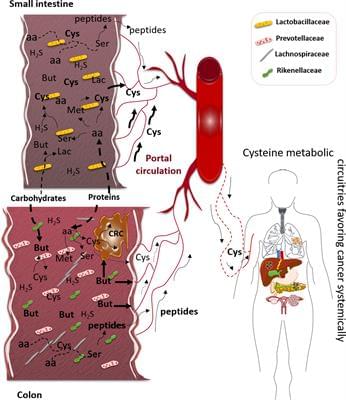Tumor metabolism is mandatory for the proper adaptation of malignant cells to the microenvironment and the acquisition of crucial cellular skills supporting the systemic spread of cancer. Throughout this journey, the contribution of the gut microbiota to the bioavailability of nutrients supporting the bioenergetic and biosynthetic requirements of malignant cells is an issue. This review will focus on the role of cysteine as a coin that mediates the metabolic crosstalk between microbiota and cancer. The key points enclose the way cysteine can be made available by the microbiota, by degradation of more complex compounds or by de novo synthesis, in order to contribute to the enrichment of the colonic microenvironment as well to the increase of cysteine systemic bioavailability. In addition, the main metabolic pathways in cancer that rely on cysteine as a source of energy and biomass will be pointed out and how the interspecific relationship with the microbiota and its dynamics related to aging may be relevant points to explore, contributing to a better understanding of cancer biology.
In the human organism, several interspecific relationships are constantly in operation, which are established between the different species that make up the microbiota and the human cells of the various organs where it resides. These interspecific relationships are mainly symbiotic in which both partners benefit. This is the case in health, but in disease, there are still some doubts about the role of the microbiota in the pathophysiology, namely, in the context of cancer, at both the organ and systemic levels. Currently, new clues have been proposed, and several studies have been developed to determine the influence of microbiota in cancer initiation, progression, and therapy, as it is extensively reviewed (1– 7).
Metabolic adaptation in cancer is undoubtedly an essential requirement for the establishment, growth, and spread of a malignant neoplasm. Cellular plasticity is crucial for the adaptation of the tumor cell to the microenvironment of the organ where carcinogenesis occurs and to the emergence of stress conditions, such as drug exposure. Recent studies prove that cysteine metabolic circuits are a relevant component of the metabolic network, sustaining biosynthesis and bioenergetics and allowing chemoresistance (as reviewed in 8 – 10). This review intends to confront some of the most recent findings in the field of cysteine metabolism in cancer and the role of the intestinal microbiota in the dynamic balance of the control of cysteine bioavailability and its putative impact on the progression of oncological disease.
